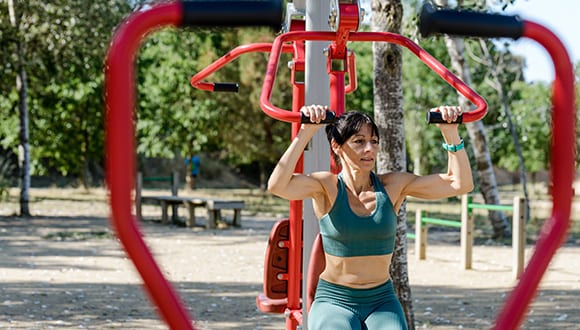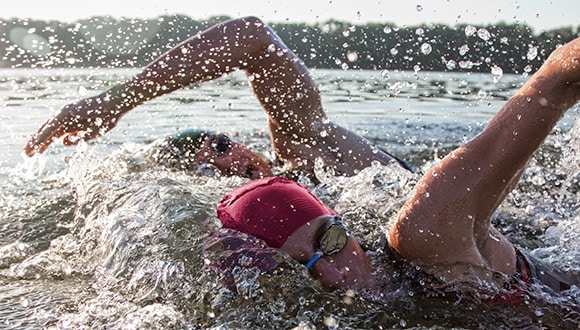7 easy ways to boost your health outdoors
Published May 2023 | 6 min read
Expert contributors Ismini Tsakiridis, accredited exercise physiologist at Exercise & Sports Science Australia (ESSA); Tamara Cavenett, practising clinical psychologist
Words by Stephanie Osfield
Spending more time in blue space, like water, and green space, like parks, can help you de-stress, get fitter and improve your memory.
If you’re feeling overstimulated, tired and wired, one of the easiest ways to find calm and boost your health and wellbeing is to head outside into nature.
This kind of self-care treatment is known as ecotherapy. Its premise is doing activities outside and it has myriad benefits.
A study review showed being outdoors reduces blood pressure, lowers your stress hormones and protects against stroke, type 2 diabetes and heart disease. Time spent in nature even has benefits for your eyesight.
“Our pleasant Australian climate, with its mild winters and warm summers, encourages outdoor exercise all year round,” says Ismini Tsakiridis, accredited exercise physiologist with Exercise & Sports Science Australia (ESSA). “From beaches and coastal cliffs to mountains, forests and bush, we have a variety of beautiful natural landscapes to enjoy. Our abundance of parks and public spaces and strong sports culture also gives us access to many outdoor activities.”
Studies show living near, spending time in and feeling connected to blue space, like water, and green space, like parks, is associated with many benefits for your mental health too, including a lower likelihood of using medication for depression and anxiety.
Enjoying these spaces with a friend or group also helps you plug into new or existing social connections. “Social connections lift your mood and improve your mental health,” says Tamara Cavenett, practising clinical psychologist. “Ecotherapy has also been shown to help people with mild to moderate depression,” she says.
To boost the health of your mind and body, try some of these free outdoor activities and don’t forget to protect your skin with sunscreen.
1. Forest bathing
This soothing Japanese practice, called shinrin-yoku, can be a fitness activity or a mindfulness practice, or both. It’s the therapeutic act of spending time soaking up the different sights, textures, sounds and smells of the forest or the Aussie bush as you hike, walk or take a leisurely stroll. As you move through the forest, take time to use all your senses to enjoy the scenery.
“Studies show spending time in nature can lower blood pressure and heart rate, and improve mood and brain function,” says Ismini. Take forest bathing up a level by planning day trips to forests with a range of different trees like eucalypts, pine trees, casuarinas, melaleucas and acacias.
2. Outdoor yoga
What’s better than a really good yoga class in a studio? Doing sun salutations outdoors as the sun rises. If the nearest park is too far, take your mat to your backyard or verandah for your morning routine, or at any time of day, to enhance your experience. Watch online videos by professional instructors to ensure good technique during postures like downward-facing dog and cobra pose.
Yoga is like a moving meditation that encourages mindfulness. “Yoga can make you feel more relaxed and increases flexibility, strength and breath control,” says Ismini. “Many parks offer free classes or you could organise your own with a group of friends.” As well as improving balance, strength and circulation, yoga reduces anxiety, so it’s a good antidote for our fast-paced modern world.

3. Outdoor exercise equipment
A good workout at the gym doesn’t have to come with flashing lights and high BPM music. Outdoor gyms are a great way to add some moderate to vigorous physical exercise to your routine in the joy of the great outdoors. They provide outdoor exercise equipment like treadmills, elliptical machines, push-up and pull-up bars, sit-up benches and stationary standing bikes – and they’re free.
If you’re nervous about trying one for the first time, go for a walk or swim with a friend and enjoy a cool-down routine at an outdoor gym after your session. Bring your own sanitising spray to clean down equipment handles and surfaces.
4. Walking in nature
Walking is a fantastic outdoor activity because it can be done anywhere, any time. “It improves cardiovascular fitness, lowers blood pressure and cholesterol levels and cuts your risk of chronic diseases like diabetes and heart disease,” says Ismini. Walking also has other positive knock-on effects that boost your health as it helps to strengthen your bones and reduce body fat.
There’s also a reason that downing tools and going for a walk helps you to problem solve – a landmark study by Stanford University found that a person’s creative output increased by an average of 60% when walking.
To maximise the health benefits of walking outside, try these tips.
- Join a walking group. Walking with others boosts your physical and mental health more than walking alone. It’s a great way to catch up with a friend or make new social connections, which boost mental and physical health.
- Walk at sunset. The light is not only good for taking photos, but makes us notice beauty and feel awe, research shows.
- Go for a beach walk. Both dry and wet sand add different kinds of resistance to strengthen your leg muscles as you walk.
- Change your walking route. Swap up your path regularly so you enjoy a mix of challenges, like walking up hills or stairs.
- Go bush hiking with friends or solo. As you navigate inclines, rocks and tree roots, you use a range of muscles, while enjoying nature’s soundtrack of birdsong, which can reduce anxiety.
5. Cycling
If you haven’t been on a bike since you were a kid (and aren’t sure if you can still balance), you can hire a bike from your nearest bike shop and go for a ride around your local park. With the sun on your face and the wind in your hair, cycling is a feel-good activity that gives you a good workout at the same time.
“As a form of aerobic exercise, cycling is easier on the joints than running and improves cardiovascular fitness and builds leg strength,” says Ismini. It also boosts your wellbeing.
If you want to challenge yourself, try out different types of bikes and change gears to pedal at different speeds and add some interval training to your ride.

6. Ocean swimming
There’s nothing like a dip or a swim in the ocean to make you feel refreshed and alive.
“Ocean swimming is an effective full-body workout, because you work against the resistance of the water,” says Ismini. “Swimming also improves lung function and is low impact, so it can be well suited to people with joint pain or injuries.”
To swim safely, stay between the flags on a beach patrolled by surf lifesavers and always use SPF30+ sunblock and reapply it regularly to avoid sunburn. Don’t give the ocean a miss if the water is chilly – cold-water swimming has been shown to help reduce depression and anxiety.
If you’re keen to swim with others, join an outdoor ocean swimming club and enjoy the camaraderie of a morning dip with the locals.
7. Gardening
From mindful weeding and nurturing planting, to careful pruning and rigorous raking, gardening is an activity that can be enjoyed by everyone from toddlers to adults.
“Gardening involves a range of movements, including squats, lunges and pushing/pulling actions, that will keep you fit, get your heart pumping and help keep your muscles strong,” Ismini says.
It’s not just a physical workout. Gardening can also be meditative, and protects your brain, with one study showing just 20 minutes of low- to moderate-intensity gardening can improve your memory. It can also help lower stress, anxiety and depression. Get your partner, kids or housemate in on the benefits and chat together while you weed and prune. Enjoying homegrown fruit and vegetables can also be a handy way to save money and reduce your grocery bill.
We’re here to help
We’ve expanded our mental health offering to include a free HealthyMinds Check-in delivered by PSYCH2U for eligible members*.
This gives you faster, easier access to qualified psychologists and digital support services to help you take control of your mental wellbeing.
Whether you’re looking for support for yourself or your loved ones, our range of mental health and wellbeing programs can help you understand and improve mental health challenges such as stress, anxiety and depression.
If you need a joint replacement, our No-Gap Joints program provides eligible members peace of mind with no out-of-pocket costs from hospital admission through to discharge and post-surgery rehab for primary hip and knee replacements, with participating private hospitals and clinicians^.
related articles
HOW EXPERTS REDUCE STRESS
We should all have strategies to keep mentally healthy. We asked five people who work in mental health what works for them.
HOW GREEN SPACES BOOST HEALTH
Why walking in the park, swimming in the ocean and chasing waterfalls can all boost your health.
THE BENEFITS OF YOGA
More people every year are turning to yoga, but are there proven health benefits?
CAN GARDENING REDUCE STRESS?
Having a green thumb can benefit your mental and physical health.
IMPORTANT INFORMATION
* 1 HealthyMinds Check-in available per member per calendar year. Service is available free to all members with hospital cover. Excludes extras only cover, Ambulance Only, Accident Only Basic and Overseas Visitors Health Cover.
^ Eligible members will need to have HCF hospital cover including primary hip and knee replacements for 12 months (excluding Overseas Visitors Health Cover). Members will be accepted into the program in line with clinical criteria by the participating clinician and hospital on a patient-by-patient basis. Must be admitted at Macquarie University Hospital, East Sydney Private Hospital or Vermont Private Hospital. You must undergo your joint replacement surgery before the proposed trial program end date. The No-Gaps Joint Program is proposed to end on 31 March 2024 at Hurstville Private Hospital, 31 March 2024 at East Sydney Private Hospital, 30 April 2024 at Vermont Private Hospital and 30 September 2024 at Macquarie University Hospital.
This communication contains information which is copyright to The Hospitals Contribution Fund of Australia Limited (HCF). It should not be copied, disclosed or distributed without the authority of HCF. Except as required by law, HCF does not represent, warrant and/or guarantee that this communication is free from errors, virus, interception or interference. All reasonable efforts have been taken to ensure the accuracy of material contained on this website. It’s not intended that this website be comprehensive or render advice. HCF members should rely on authoritative advice they seek from qualified practitioners in the health and medical fields as the information provided on this website is general information only and may not be suitable to individual circumstances or health needs. Please check with your health professional before making any dietary, medical or other health decisions as a result of reading this website.